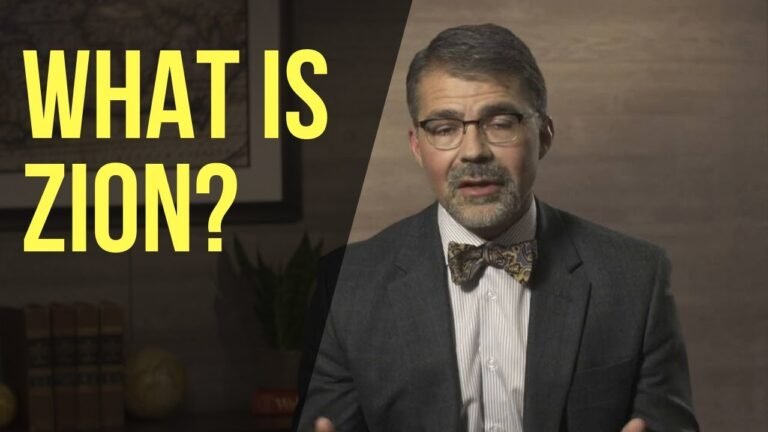Understanding Zion: A Comprehensive Definition
Zion, a term steeped in historical and cultural significance, often evokes images of a promised land, spiritual refuge, and a symbol of hope. Rooted in biblical texts, it represents not only a physical location but also an ideal of unity and aspiration for many communities. In contemporary discourse, Zion transcends its religious origins, embodying a diverse range of meanings across various contexts, from political movements to artistic expressions. This exploration seeks to define Zion in its multifaceted dimensions, shedding light on its relevance in today’s society.
What does Zion mean?
Zion holds profound significance as both a specific geographical location and a broader spiritual concept. At its core, it refers to a hill in Jerusalem, symbolizing not only the city itself but also the aspirations of a holy place where divine presence is felt. This historical site has been a focal point for Jewish identity and religious devotion throughout the ages.
Beyond its physical representation, Zion embodies the idea of a “kingdom of heaven,” serving as an emblem of hope and unity for many. Rooted in the Hebrew term Tsiyon, the word resonates deeply within the Jewish faith, evoking themes of redemption, peace, and a promised future. As such, Zion continues to inspire countless individuals seeking connection to their heritage and spiritual ideals.
What does Zion symbolize?
Zion represents more than just a geographical location; it embodies a deep yearning for safety, belonging, and freedom. Originating from the Jewish experience of exile during the Babylonian captivity, the concept of Zion has transcended its historical roots to resonate with various marginalized groups throughout history. This longing reflects a universal human desire for a place to call home, especially for those who have faced displacement and oppression.
For Christian black slaves in the United States, the metaphor of Zion took on profound significance. It became a symbol of hope and resilience in the face of unimaginable suffering. The spirituals sung by these slaves often referenced Zion, transforming it into a beacon of liberation and a promised land where they could escape the harsh realities of their lives. This connection illustrates how the metaphor can evolve, adapting to the needs and aspirations of different cultures.
Today, Zion continues to serve as an emblem of hope for many who find themselves navigating the complexities of displacement and identity. It reminds us that the quest for a safe homeland is not confined to any one group but is a shared human experience. As such, Zion stands as a powerful metaphor for the enduring spirit of those who seek solace, belonging, and a brighter future in a world often marked by adversity.
What is the meaning of the name Zion in Hebrew?
The name Zion carries rich and multifaceted meanings in Hebrew, drawing from its roots in the terms ṣiyyôn, which translates to “castle,” and ṣiyya, meaning “desert.” This duality reflects both strength and resilience, encapsulating the essence of a fortified stronghold amidst the barrenness of the surrounding landscape.
Most prominently, Zion signifies the “highest point,” a reference to the ancient citadel of Jerusalem that was conquered by King David. This connection to a revered historical and spiritual site reinforces the name’s importance, symbolizing not just a geographical peak but also a pinnacle of faith and cultural identity that continues to resonate with people today.
Unpacking the Meaning Behind Zion
Zion is a term that resonates deeply across various cultures and traditions, often symbolizing a place of refuge or a utopian ideal. In religious contexts, particularly within Judaism and Christianity, Zion represents the promised land, a sacred space where divine presence dwells. This notion transcends mere geography; it embodies hope, spiritual fulfillment, and the aspirations of a community striving for peace and connection.
In contemporary discourse, Zion has evolved to encompass broader themes of identity and belonging. For many, it serves as a metaphor for the pursuit of justice and equality, particularly within marginalized groups. The concept invites individuals to reflect on their own journeys and the spaces they inhabit, urging a collective understanding of what it means to seek a haven in a world often marked by division and conflict.
Ultimately, unpacking the meaning of Zion reveals a tapestry of interpretations that unify the quest for a better tomorrow. Whether viewed through the lens of faith, social justice, or personal aspiration, Zion encapsulates the enduring human desire for a place where love, acceptance, and harmony reign. This exploration encourages a dialogue about our shared values and the ways in which we can work together to create our own versions of Zion in the world today.
Exploring the Essence of Zion
Zion National Park, a breathtaking expanse of natural beauty, captivates visitors with its dramatic landscapes and rich biodiversity. Towering red rock formations, deep canyons, and lush vegetation come together to create a tapestry of colors and textures that change with the seasons. Each trail offers a unique perspective of this geological wonder, inviting adventurers to immerse themselves in the serene environment and witness nature’s artistry firsthand.
The park is not just a feast for the eyes; it is also a sanctuary for countless species of flora and fauna. From the delicate wildflowers that bloom in spring to the majestic mule deer that roam the trails, Zion is a living testament to the resilience of nature. Birdwatchers can delight in spotting the peregrine falcon, while geology enthusiasts can explore the fascinating rock layers that tell the story of the Earth’s history. This rich ecological diversity underscores the importance of preserving such a vital ecosystem for future generations.
Zion’s cultural heritage adds another layer of depth to its allure. The park has been a sacred space for Indigenous peoples for thousands of years, with their stories woven into the very fabric of the land. Today, visitors can engage with this history through guided tours and educational programs that highlight the significance of the area’s cultural past. Whether hiking the iconic Angels Landing or simply soaking in the panoramic views from the canyon rim, each moment spent in Zion is a reminder of the interconnectedness of nature and humanity.
Zion: A Deep Dive into Its Significance
Zion stands as a multifaceted symbol, representing both a physical and spiritual haven. Nestled within the breathtaking landscapes of Utah, Zion National Park draws millions with its towering cliffs, winding canyons, and vibrant ecosystems. Yet, beyond its stunning beauty, Zion embodies themes of redemption, refuge, and the pursuit of freedom, resonating deeply within various cultural narratives and religious traditions. This duality of Zion as both a geographical marvel and a metaphorical sanctuary invites exploration into how it has influenced art, literature, and spiritual quests throughout history.
The significance of Zion transcends its immediate allure, offering a lens through which to examine human connection to nature and the quest for belonging. For many, it serves as a reminder of resilience and hope, a place where the challenges of life can be confronted amidst the tranquility of nature. As visitors traverse its trails and peaks, they not only experience the grandeur of the landscape but also engage in a personal journey of reflection and renewal. Thus, Zion stands not merely as a destination, but as a profound representation of the human spirit’s enduring search for meaning and peace.
The Many Dimensions of Zion Explained
Zion represents more than just a geographical location; it embodies a rich tapestry of cultural, spiritual, and historical significance. For many, it is a symbol of hope and resilience, rooted in the narratives of those who have sought sanctuary and belonging. From its biblical origins to its contemporary interpretations, Zion has inspired countless movements and ideologies, reflecting the diverse aspirations of people across the globe.
As a natural wonder, Zion National Park captivates visitors with its breathtaking landscapes and unique geological formations. Towering cliffs, winding canyons, and vibrant ecosystems create a stunning backdrop that draws adventurers and nature lovers alike. The park serves as a reminder of the beauty and power of nature, inviting exploration and reflection, while also fostering a deep appreciation for the environment and the importance of conservation.
On a deeper level, Zion resonates with those in search of spiritual fulfillment and community. It is a concept that transcends borders, inviting individuals to connect with their heritage and discover shared values. Whether through religious practices, artistic expressions, or communal gatherings, Zion fosters a sense of unity and purpose, encouraging people to come together in pursuit of a greater understanding of themselves and each other.
Decoding Zion: Insights and Interpretations
Zion, often regarded as a symbol of hope and divine promise, transcends its geographical roots to embody a profound spiritual and cultural significance. Throughout history, interpretations of Zion have evolved, reflecting the aspirations and struggles of various communities. From its portrayal in religious texts to its representation in contemporary art and music, Zion serves as a powerful reminder of resilience and the quest for belonging. As we delve into its rich tapestry of meanings, we uncover insights that resonate with the universal human experience, inviting us to explore our own connections to identity, faith, and the pursuit of peace.
Understanding the multifaceted concept of Zion enriches our appreciation for its historical, cultural, and spiritual significance. Whether viewed through the lens of religious belief, national identity, or social justice, the term encapsulates a longing for connection, belonging, and hope. As we explore the diverse interpretations and implications of Zion, we uncover a powerful narrative that continues to inspire and resonate across generations, reminding us of the enduring human quest for a promised land.





